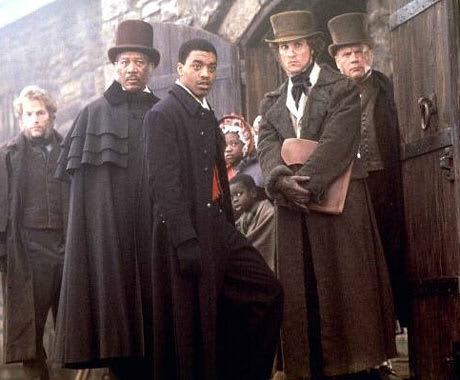Not one of the more memorable films in the illustrious career of Steven Spielberg, Amistad is an admirable but bloated courtroom drama that ultimately gets too bogged down under the weight of its own sentimentality. However, it does feature a powerful performance by Djimon Hounsou in his first role and some inspired sequences, proving that it's hard not to find something to admire when Spielberg is behind the camera.
The best of these may be the film's opening, in which Cinque (Hounsou) escapes from his chains and leads a mutiny aboard the Spanish slave ship La Amistad, all while lit by periodic flashes of lightning. Representing the slaves in their effort to be released is a property lawyer portrayed by Matthew McConaughey in a performance that's noticeably pre-McConaughssance, as the trial drags on seemingly only because President Van Buren (Nigel Hawthorne) recognizes that letting the slaves free may be damaging to his upcoming campaign for re-election.
Anthony Hopkins, as John Quincy Adams, pops up intermittently to chew the scenery and delivers a grandstanding and interminable speech near the end that appears to make up the entirety of the case before the Supreme Court. It's also ironic to see Chiwetel Ejiofor in a small but pivotal role as a translator, considering that he would make a much better film about slavery 16 years later with 12 Years A Slave.
The only supplemental material included in this release is a making-of featurette that's a little longer than the usual fare but not all that much more enlightening. It is heartening, though, to see how Spielberg works on the set, both a beacon of energy and good cheer to his actors and someone who's able to effectively communicate to his collaborators precisely what he wants from every scene.
(Paramount Pictures)The best of these may be the film's opening, in which Cinque (Hounsou) escapes from his chains and leads a mutiny aboard the Spanish slave ship La Amistad, all while lit by periodic flashes of lightning. Representing the slaves in their effort to be released is a property lawyer portrayed by Matthew McConaughey in a performance that's noticeably pre-McConaughssance, as the trial drags on seemingly only because President Van Buren (Nigel Hawthorne) recognizes that letting the slaves free may be damaging to his upcoming campaign for re-election.
Anthony Hopkins, as John Quincy Adams, pops up intermittently to chew the scenery and delivers a grandstanding and interminable speech near the end that appears to make up the entirety of the case before the Supreme Court. It's also ironic to see Chiwetel Ejiofor in a small but pivotal role as a translator, considering that he would make a much better film about slavery 16 years later with 12 Years A Slave.
The only supplemental material included in this release is a making-of featurette that's a little longer than the usual fare but not all that much more enlightening. It is heartening, though, to see how Spielberg works on the set, both a beacon of energy and good cheer to his actors and someone who's able to effectively communicate to his collaborators precisely what he wants from every scene.
